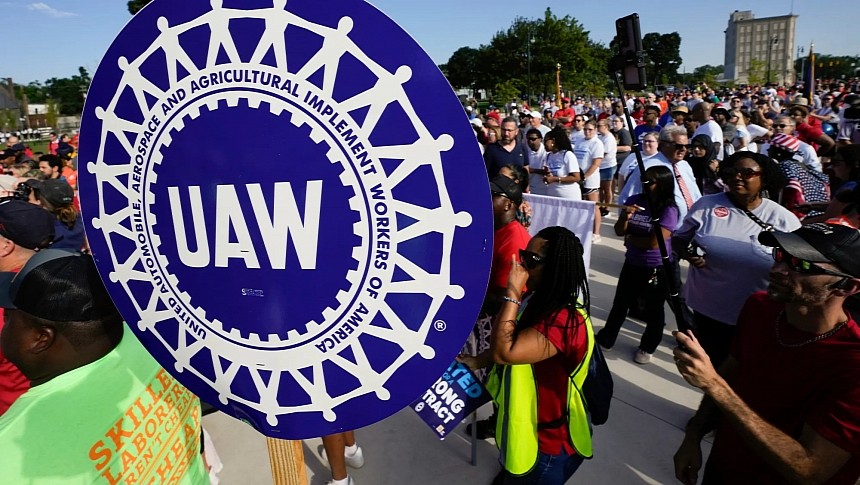After months of back-and-forth negotiations between America's three preeminent automakers and United Auto Workers, the nation's largest auto-industry union, a full-on workers' strike, which experts warned could be catastrophic for the sector, appears to be going full steam ahead. After the pre-determined cutoff date of Thursday, September 14th at midnight came and went without a single agreement between both parties, automotive plants across Mo-town are due to cease production as workers and employers slug it out at the picket line with no sign of remediation in sight.
In a walkout that amounts to more than 12,700 employees in Detroit, from custodians to production floor managers and every position in between, workers represented by UAW have stood in stark defiance of their corporate overseers over the last several months. Among their list of demands is unilateral worker pay raises by at least 40 percent across the range, a 32-hour work week compensated as though it were a standard 40 hours without financial penalty, and the restoration of auto worker pensions, which GM, Chrysler, and Ford employees once took for granted decades ago to be restored to their full capacity.
After representatives from all three American manufacturers were met with abject rejection across the board, UAW reps have declared it old-fashioned corporate greed, not an overreaching worker populace, who ensured the biggest global automotive strike of the 2020s was nothing short of inevitable. With the American auto sector now in jeopardy of being brought to its knees, everyone from Michigan State representatives to the President of the United States himself has thrown their hat in the ring in a desperate hope to ward off the worst effects of a wide-scale worker's strike. Unfortunately, as was the case with the Writers Guild of America strike, which is still ongoing, there appears to be a great deal of bad blood between the two participating parties.
The great fear among the automotive community is this bad blood creating a barrier between a fair and honest resolution to the strike, one besieged by a desire on the part of UAW and Detroit's big three automakers to exact some form of revenge or retribution on the other side. When it's all said and done, the group is guaranteed to suffer the most under the current circumstances are North American car buyers, already beset by the greatest increase in the price of new automobiles since the global health crisis of the last three years brought forth a supply chain shortage some experts argue hasn't fully subsided. This is without mentioning the obvious loss of income and financial harship inherant to the participants of UAW's sector-wide strike. It's a statistic that shouldn't be lost in the considerable emotions packed into every moment of this pivotal moment for the American auto sector.
As the strike process rears its ugly head over the coming weeks and months, only time will tell if its events will lead to the dire consequences some feared could transpire or if some form of compromise could be made. Sadly, this appears like a pie-in-the-sky fantasy for the moment.
After representatives from all three American manufacturers were met with abject rejection across the board, UAW reps have declared it old-fashioned corporate greed, not an overreaching worker populace, who ensured the biggest global automotive strike of the 2020s was nothing short of inevitable. With the American auto sector now in jeopardy of being brought to its knees, everyone from Michigan State representatives to the President of the United States himself has thrown their hat in the ring in a desperate hope to ward off the worst effects of a wide-scale worker's strike. Unfortunately, as was the case with the Writers Guild of America strike, which is still ongoing, there appears to be a great deal of bad blood between the two participating parties.
The great fear among the automotive community is this bad blood creating a barrier between a fair and honest resolution to the strike, one besieged by a desire on the part of UAW and Detroit's big three automakers to exact some form of revenge or retribution on the other side. When it's all said and done, the group is guaranteed to suffer the most under the current circumstances are North American car buyers, already beset by the greatest increase in the price of new automobiles since the global health crisis of the last three years brought forth a supply chain shortage some experts argue hasn't fully subsided. This is without mentioning the obvious loss of income and financial harship inherant to the participants of UAW's sector-wide strike. It's a statistic that shouldn't be lost in the considerable emotions packed into every moment of this pivotal moment for the American auto sector.
As the strike process rears its ugly head over the coming weeks and months, only time will tell if its events will lead to the dire consequences some feared could transpire or if some form of compromise could be made. Sadly, this appears like a pie-in-the-sky fantasy for the moment.


















